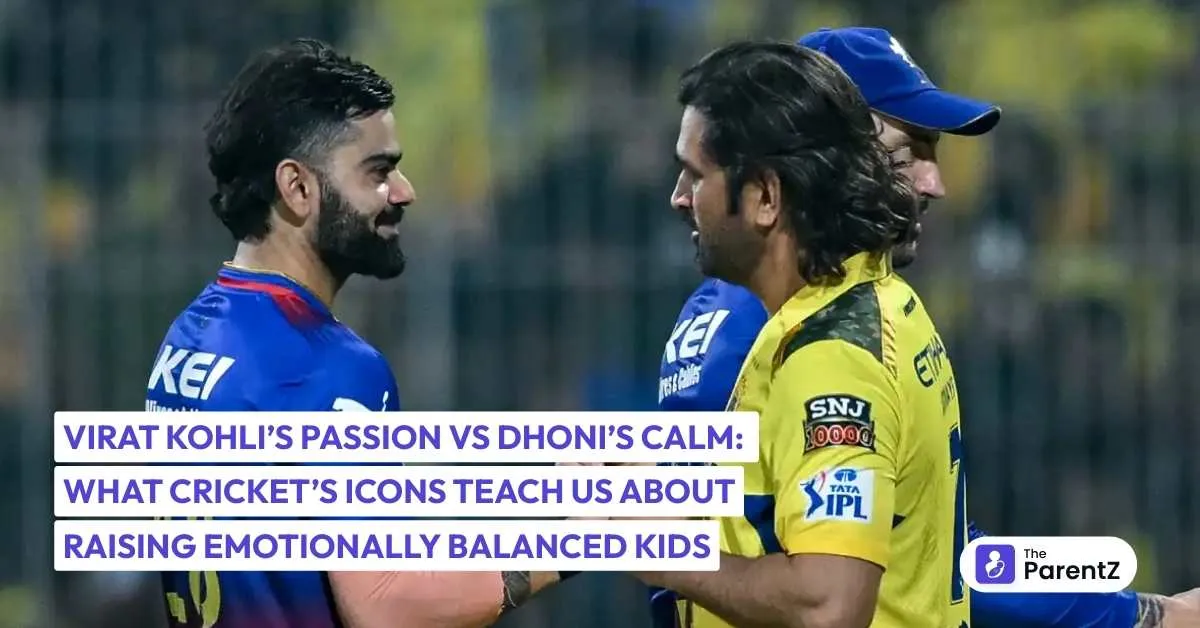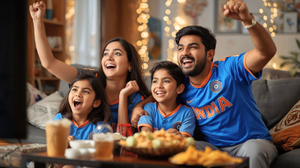Understanding the Emotional Spectrum: Passion and Calmness
Virat Kohli’s passion is electric. It fuels ambition. It drives performance. It says, “I care, deeply.” Children like this are spirited and expressive. They’re often seen as natural leaders, but can sometimes struggle with regulation—overreacting to setbacks or becoming easily frustrated.
MS Dhoni’s calmness, in contrast, is like a rock in a storm. It reflects inner discipline, patience, and emotional self-control. Kids with this temperament tend to be observers, thinkers, and excellent under pressure. But they may hold back feelings or struggle to express themselves.
The goal isn’t to “pick” a personality type. It’s to help children access both—knowing when to lean into fire, and when to lean into stillness.
What Virat Teaches Us About Emotion
Kohli has redefined what it means to be expressive in sport. His passion isn’t reckless—it’s channeled. He uses emotion as energy.
Parenting Insight: Expressive kids aren’t being “too much.” They’re often seeking connection, clarity, or validation. Instead of silencing their energy, teach them how to channel it. Say:
- “I love how much you care. Let’s figure out how to say it in a way others can hear.”
- “It’s okay to be upset. But let’s take a breath before we decide what to do next.”
Let them feel fully—but also guide them toward thoughtful expression, not reactive impulse.
What Dhoni Teaches Us About Composure
MS Dhoni doesn’t react. He responds. He knows that calmness is a strength, especially under pressure. That composure isn’t the absence of emotion—it’s the ability to hold it without being owned by it.
Parenting Insight: Calm kids aren’t necessarily shy or disengaged. They’re internal processors. Create spaces for them to open up, without rushing them. Try:
- “You seemed quiet after school. Want to talk now, or later?”
- “It’s okay if you’re not ready to share. I’ll be here when you are.”
Celebrate their quiet wisdom—but also encourage healthy emotional expression, so they don’t learn to bottle things up.
Balancing the Two: Why Kids Need Both
In today’s world, our kids need more than academic skills. They need emotional agility. The ability to feel deeply, like Kohli, and think clearly, like Dhoni. To stand up for themselves without lashing out. To navigate stress without shutting down.
How to nurture both traits:
- Role-model it: If you lose your temper or shut down emotionally, narrate your recovery out loud: “I was feeling really overwhelmed. I took a few minutes and now I’m ready to talk calmly.”
- Practice emotional vocabulary: Instead of “I’m fine” or “I’m angry,” teach them to say: “I feel nervous because I don’t want to fail.", "I’m disappointed because I really wanted that to work.”
- Offer safe spaces for both types of kids: High-energy kids need physical outlets. Thoughtful kids need time to process. Offer both.
Conclusion
Virat Kohli and MS Dhoni may play the same game, but their styles remind us of an important parenting truth: there’s no one “right” way to feel or lead. What matters is knowing yourself—and learning how to bring your emotions in balance with your goals.
So, whether your child is the passionate dreamer or the quiet thinker—or a beautiful mix of both—help them own their emotional voice.
Not by choosing between fire and calm. But by teaching them when to use each.
Because emotional balance isn’t about who they become on the field. It’s about who they become in life.





Be the first one to comment on this story.